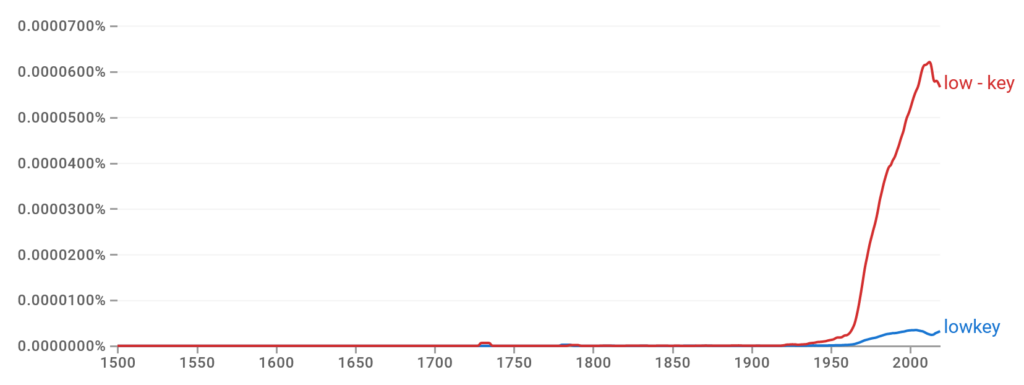Low-key is an idiom that typically means something quiet, chill, or secretive. It can be used as either an adjective or an adverb to mean secretly, done quietly, or relaxed and unnoticeable. Lowkey is a variant often found in informal conversations, particularly in internet slang.
They’re so similar, with each variation used interchangeably to describe something quiet or secretive, but their usage depends on the context. For example, you could say, “I lowkey love Taylor Swift, don’t tell anyone,” or “Come over and hang out tonight; it’s a very low-key vibe.”
Idioms, such as low-key and lowkey, are expressions with a figurative meaning that differs from their literal interpretation. They enrich communication, conveying cultural nuances and adding expressive depth to the English language.
This article delves into more details on the term’s meaning, origin, variations, related terms and phrases, and proper usage with sentence examples. Understanding the subtle differences between the two will make you look like a pro, so read on and test your skills with the quiz at the end!

What Does Lowkey or Low-Key Really Mean?
Lowkey and low-key are both used to describe something subtle or even top secret. They’re pronounced exactly the same, so their only differences lie in their spelling, punctuation, level of formality, and surrounding context.
The Cambridge Dictionary defines low-key and lowkey as “quiet and not attracting a lot of attention or excitement” when used as adjectives. But it further states that they can also be adverbs “used when you are expressing an opinion, but you do not want to emphasize it too much.”
Merriam-Webster and Dictionary.com further support this definition of the idiom low-key, stating that it’s a term used to express that something has a reduced or restrained intensity.
What Are the Literal and Figurative Meanings of the Idiom?
Literally, both versions might refer to actual music keys, specifically one of the lower keys. But figuratively, lowkey and low-key express a desire to keep things understated or secretive. These terms allow for a way to communicate intensity without being overtly expressive.
Are There Variations of This Idiom?
The variations of these terms lie in how they’re used. Both the hyphenated and unhyphenated versions can be used interchangeably as both an adverb and an adjective. Their meanings are virtually identical, but removing the hyphen makes it less formal.
- Lowkey Adjective: My sister’s style is lowkey elegant, never flashy, but always noticeably refined.
- Lowkey Adverb: Darren lowkey hoped the party would be canceled so he could stay in and read his new book.
- Low-key Adjective: The flash wedding was a low-key affair, with just a few close friends in the backyard.
- Low-key Adverb: Low-key, Candace admired the way the sunset painted the ocean’s surface in hues of orange and purple.
How Is the Idiom Used, and What Are Some Examples?
Lowkey or low-key has found its way into aspects of contemporary language, becoming especially prevalent in internet slang and among younger demographics.
What Are Different Ways of Using the Idiom in Context?
The terms lowkey and low-key can be used in various ways in conversation. Here are some examples:
- As an adverb to soften a statement or confession
- Lowkey: “I lowkey wish I didn’t have to go to work tomorrow.”
- Low-key: “She’s low-key talented in cooking.”
- To indicate subtlety or quietness in action or manner.
- Lowkey: “It was a lowkey celebration, just a few close friends.”
- Low-key: “The event was a low-key affair, unlike their usual extravagant parties.”
- To suggest a sense of confidentiality or secrecy
- Lowkey: “I’m lowkey seeing someone right now, but I haven’t told my family yet.”
- Low-key: “Their relationship is low-key; not many people know about it.”
- To indicate a relaxed or calm state.
- Lowkey: “Let’s have a lowkey night in instead of going out.”
- Low-key: “After such a hectic week, I’m hoping for a low-key weekend.”
Note: The term lowkey is typically used in more informal contexts, particularly in internet slang. Low-key is more formally accepted.
Are There Notable Examples of the Idiom in Movies, Books, or Media?
The idiom has appeared all over media, from dialogues in movies and TV shows to being used in literature, showcasing its widespread acceptance and usage.
Here are some examples of the idiom in some publications:
Pope Francis celebrated a low-key Christmas Eve Mass made somber by the coronavirus pandemic and said people should feel obliged to help the needy because Jesus himself was born a poor outcast. (Toledo Blade)
Detroit’s Anna Burch drops Carpenters-esque Christmas single just in time to lowkey depress us for the holidays (Detroit Metro Times)
I lowkey tried to kind of talk her out of it, but, of course, I’m going to support her with whatever she’s going to do.” (SMU Daily Campus)
How Is the Idiom Commonly Misinterpreted or Misused?
Some people might confuse lowkey or low-key with a low key in a literal sense, expecting it to always refer to something being physically low or quiet, and thereby missing its figurative use.
Additionally, these terms, especially lowkey in internet slang, can be overused in contexts where they are not appropriate. While they are effective for conveying a subtle intensity or understated emphasis, they might not fit well into formal or academic writing. The use of these terms is best suited for informal speech or writing and should be used sparingly in more formal contexts.
What Is the Origin of the Idiom Lowkey or Low-Key?

Low-key is rooted in musical terminology from the mid-19th century and is used to describe low, quiet notes or sounds. However, its slang counterpart, lowkey, has surged in popularity in the 21st century, especially on social media platforms and among younger demographics. Despite this, the hyphenated version still surpasses lowkey in usage.
What Are the Related Terms to This Idiom?
Enhance your understanding and ability to use lowkey or low-key with alternative terms and phrases.

What Are Some Synonyms?
- Understated
- Subdued
- Down-low
- Quiet
- Simple
- Secretive
- Relaxed
- Quietly intense
What Are Related Terms and Phrases?
- On the down-low
- In a subtle way
- Without drawing attention
What Are Some Antonyms?
- Overtly
- Clearly
- Openly
- Loudly
Lowkey or Low-Key: Test Your Knowledge!
Choose the correct answer.
We Lowkey Love Idioms!
The terms lowkey and low-key provide a nuanced way to express subdued intensity or confidential desires. Recognizing their musical origins and their adaptation into modern slang enhances our understanding and usage. By knowing when and how to correctly apply these terms, we can enrich our spoken and written communication.
Continue to explore our website for more comprehensive guides on commonly used idioms and phrases.
Enjoyed reading about this idiom? Check out some others we covered:
